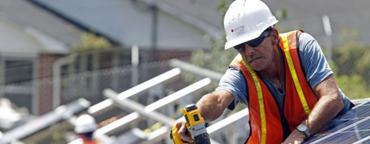
Backers of a proposed constitutional amendment to expand the use of solar energy say it might be four years before they would again seek voter approval if the current ballot language is rejected by the Florida Supreme Court.
But Leaders of Floridians for Solar Choice, which is seeking to allow businesses to generate and sell small amounts of solar power to customers on the same or neighboring properties, expressed confidence during a media conference Monday that the state's top court will sign off on the proposed amendment for the November 2016 ballot.
The Supreme Court will hear arguments Tuesday, a critically important step in the constitutional amendment process. Supporters of the initiative acknowledge there would not be enough time to restart a petition drive to get on next year's ballot if a court ruling, which may not come for up to 60 days, rejects the proposed language.
And with a desire to time the initiative with the presidential-election calendar, which traditionally brings out more voters, the proposal may have to wait until 2020.
"We would have to evaluate that," Stephen Smith, executive director of the Southern Alliance for Clean Energy, said after the media event at the Florida Press Center. "I always think you want to run one of these things in a presidential year, because you have a larger turnout and a whole different demographic."
The Southern Alliance for Clean Energy is the biggest backer of Floridians for Solar Choice.
Smith and Tory Perfetti, chairman of Floridians for Solar Choice, are also dubious about getting state lawmakers to agree to put such a ballot imitative before voters in 2016 or even 2018 due to the influence of the state's largest power companies.
After hearing arguments Tuesday, the court will have to decide if the ballot language is limited to a single subject, the wording is unambiguous and that the summary meets a 75-word limit.
Opponents of the proposal are expected to argue, at least in part, the measure lacks regulatory oversight.
"The way I read their amendment is that there will be a constitutional exemption from regulation," Matthew Carter, a leader of Consumers for Smart Solar and a former Public Service Commission chairman, said Monday. "For example, let's say you have a billing problem, let's say you have a customer service issue, there are protections now. For lower systems, you have local government. For major systems, you have the PSC."
Opponents, including the state's major electric utilities and Attorney General Pam Bondi, also have described the ballot summary as "vague" and "misleading," claiming it fails to disclose the impact on local-government revenue sources.
The Floridians for Solar Choice amendment, in part, would allow businesses to generate and sell up to two megawatts of power to customers on the same or neighboring properties. Two megawatts have been estimated as providing the daily needs of a typical Wal-Mart or residential communities between 225 and 714 homes.
The ballot summary states the intent of the amendment: "Limits or prevents government and electric utility imposed barriers to supplying local solar electricity. Local solar electricity supply is the non-utility supply of solar generated electricity from a facility rated up to 2 megawatts to customers at the same or contiguous property as the facility. Barriers include government regulation of local solar electricity suppliers' rates, service and territory, and unfavorable electric utility rates, charges, or terms of service imposed on local solar electricity customers."
Florida Power & Light, Duke Energy, Tampa Electric Co. and Gulf Power have filed a joint brief that argues the "title and ballot summary improperly use political rhetoric, mislead the voter through substantive inconsistencies between the summary and text, and hide the ball by failing to disclose to voters the current state of the law of utility regulation and the sweeping changes this initiative would create.''
Bondi also filed a brief in opposition and said the measure, "as written, will leave voters uninformed and consumers vulnerable."
"As a large and growing state, Florida needs a diverse energy portfolio that includes solar energy, however, the proposed constitutional amendment mandates major changes in existing law, using language that is unclear and misleading,'' she said in a prepared statement in June.
As of Monday, the state Division of Elections had verified 121,107 of the 683,149 signatures needed by Floridians for Solar Choice to get on the November 2016 ballot. The signatures collected are good only toward the currently proposed language.
If the initiative gets on the ballot, it would need approval from 60 percent of voters to pass.
Consumers for Smart Solar also is proposing a ballot initiative that would allow Floridians with solar equipment on their properties to sell energy to power companies and "ensure that consumers who do not choose to install solar are not required to subsidize the costs of backup power and electric grid access to those who do."
The state Division of Elections, as of Monday, had received 1,073 valid petition signatures for the Consumers for Smart Solar proposal.


